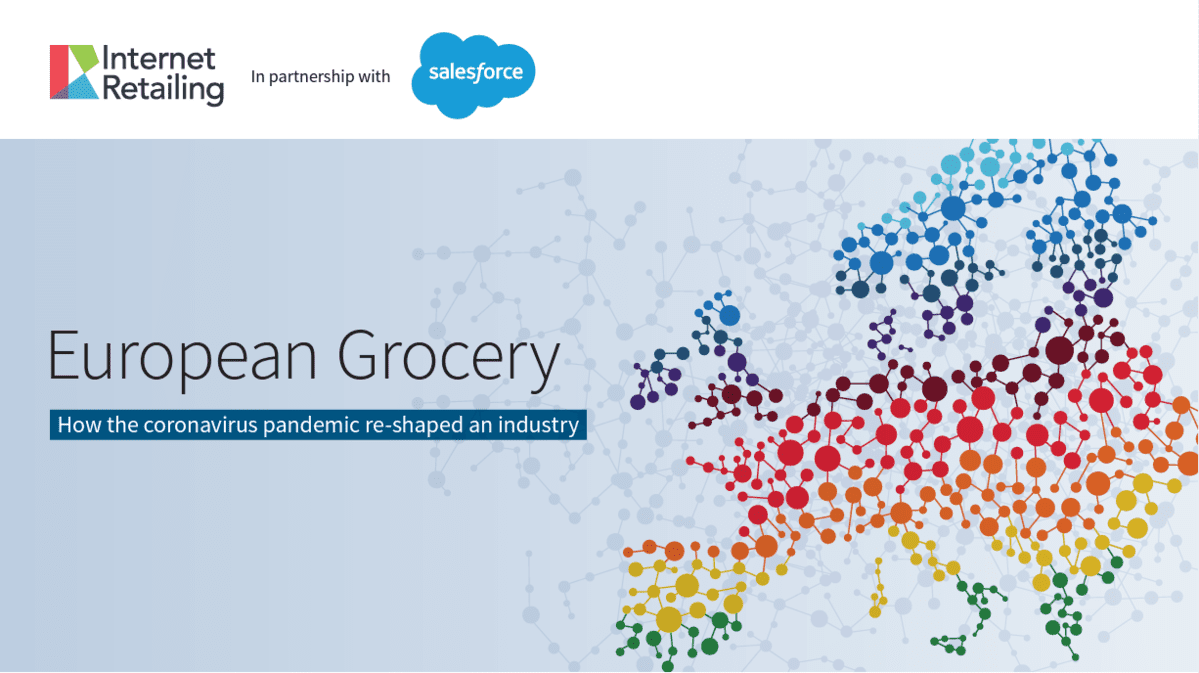
In partnership with Salesforce, InternetRetailing set out to determine the focus areas, growth vectors and priorities for leading grocers, FMCG and CP brands. In late 2020, we surveyed and interviewed retailers and brands across Europe asking about their priorities for the coming 12 months. This Grocery Innovation Report highlights those priorities.
Supplemental interviews, and pan-European and country-specific data, show the extent of the challenges and changes being overcome as the pandemic continues to influence the industry and consumer behaviour.

“As we think about the overall plans that encompass online and offline with our retail partners, the insights that we gain into the new occasions and how people are buying we bring that back into our marketing teams, category teams and our brands to strengthen our products and make them more relevant to our shoppers.”

“In a sense we are a tech company as a core because everything is run by tech and how we operate around big data and the user experience. Our system could be applied to any other industry as long as you have a barcode or QR.”

“At peak, which is the week or two prior to Christmas when we make the delivery slots available to customers, we would typically see an increase in traffic to our website of about 2 times compared with the baseline. On the weekend during the prime minister’s first announcement [of the UK’s lockdown] we saw a 45-times increase in traffic and demand.”

“For the multinationals D2C is definitely not a sales channel compared to the traditional
channels. I view it as a fantastic data collection system where you can get to know your customers better, but it’s not really efficient in terms of sales as you do not have the scale. When you are a small brand and you rely on D2C, then it becomes your life and death experience. It’s very different and that’s why we see so many small brands disrupting the market, as not only do they have a physical presence but they also have a digital store and for them, proportionally, the digital store is quite important in terms of total sales.”

“Data helps us understand our customers better. Above all, the goal of increasing the period
we keep purchase data is to bring more services that make the daily lives of co op members easier, as well as to develop our range of products to be as suitable as possible.”

“In 2021, we’ll finish the job of making sure everyone in the UK has access to the service. Equally, we need to look at the product roadmap and accelerate some of the enhancements we’ve already set in motion.”

“Suggesting healthier crisps with less salt is straightforward. The question is, what use cases can we find that are relevant for people and how do we get them done? How do we know whether the data belongs to you or your wife who does the shopping? The relevancy for me is crucial and that’s something that’s a real challenge.”

“The macro trends that were getting behind challenger brands for the past ten years have never been stronger. Their agility, their closeness to the consumer and their connections with the consumer, their ability to deliver flexibility, differentiation, distinctiveness. All of these things have never been more powerful.”

“What we are doing is telling the category growth story with different and longer-term insights so we can be more accurate about what we know is going to happen in the future. This helps retailers manage and structure the category accordingly to deliver the best for their shoppers.”

“We’re still having to react very fast. There is still the same amount of high-level variables at play, but we know a lot more about each of the variables.”

“A huge part of the collaboration has come from data and a huge part of it will continue to come from there. The challenge for suppliers is to make sure we are coming back with the right consumer-centric plans and category strategies for our partners.”